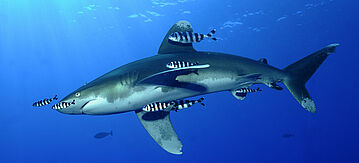CITES rejects EU proposals
The parties to the Convention on International Trade in Endangered Species of Wild Fauna and Flora (CITES) failed to agree on stronger protection for endangered fish species last night. The proposals submitted by the EU, the United States and other countries did not receive the required majorities at the CITES COP 15 conference which took place in Doha, Qatar from 13 – 25 March.
At the Doha conference, which ended yesterday, the EU proposal put forward by Germany on the protection of the porbeagle missed the requires two-third majority by one vote. Previously, the proposal on the spiny dogfish had also failed to receive the necessary support. Both shark species also live in German waters. Their meat is sold as a specialty called 'Schillerlocken' (strips of smoked fish) or as fish and chips. Depletion of the stocks of both species through overfishing has reached a critical stage. Germany's aim was therefore to list these species in Appendix II of the Convention. Although this status of protection allows for international trade, it would have been limited to shark stocks which are not adversely affected by fishing.
The United States, which submitted proposals for six shark species to be listed in Annex II, suffered the same failure. The proposals were either withdrawn before the decisive vote or they failed to win the required majorities. Equally abortive was the proposal put forward by Monaco on a temporary ban on international trade of the bluefin tuna.
However, some amphibian species made it into the CITES Appendices this year: some tree or leaf frog species from Central America, for example, were listed in Appendix II of the Convention and the Luristan newt from Iran even received the strict protection status of Appendix I. Moreover, elephants in Tanzania and Zambia retained their protection status under Appendix I.

